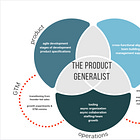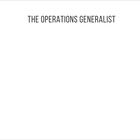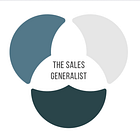What’s the difference between a customer success specialist and a customer success generalist?
The 7th in a new hWD series on generalist vs. specialist hires. This week? Customer Success
The performance of the customer success function for an early-stage startup is a leading indicator of future growth. Startups that prioritize customer success grow 2.5 times faster than those that don't. It's often recommended to build a customer success function sooner rather than later, even before launching a product as happy customers drive referrals and create a positive cycle of growth. Understanding the intricacies of hiring specialists and generalists for customer success roles is essential for building a team equipped for long-term retention and growth.
Reframing customer success in the early days
To maintain a customer-centric approach as your early-stage startup transitions from achieving product-market fit to scaling, it's imperative to foster a culture of active listening. This involves continuously tuning into customer needs, pain points, and feedback, and leveraging those insights to shape your product roadmap. You will ensure that your offerings remain relevant and valuable by prioritizing solving real problems faced by your customers.
It's essential to place the customer at the forefront of every decision and action taken within your startup. Adopt a customer-obsessed mindset right from the outset. Whether it's refining your product features, optimizing your user experience, or enhancing your customer support, consistently prioritizing the needs and satisfaction of your customers is key to building a strong foundation for long-term success. By ingraining this customer-centric ethos into your startup's DNA early on, you can create a culture that is inherently geared towards delivering exceptional value and fostering meaningful relationships with your customer base.
The Customer Success Specialist
A customer success specialist is someone who has deep, focused knowledge and skills in a specific area or domain within customer success. They may be subject matter experts in areas such as technical support (expertise in your product/service), implementation (focused on seamless customer onboarding), adoption (driving product usage over time), or renewals (extensions and upsells).
Specialists bring in-depth knowledge and can provide advanced guidance and solutions within a core area of focus. In the early days, they will have specialized experience in one or more of these motions.
The Customer Success Generalist
On the other hand, a customer success generalist has a broad understanding of various customer success functions and can handle multiple responsibilities across the customer lifecycle. Generalists are versatile and can adapt to different customer needs, acting as a single point of contact. Their roles may include managing the end-to-end customer journey, providing general support and troubleshooting, conducting training and enablement, coordinating cross-functional resources, or identifying upsell and cross-sell opportunities.
Further, if resources are tight, this professional may stretch into traditional sales or product management roles, supporting the initial prospect to full product adoption, while helping the internal team guide the long-term product build to meet the customer’s needs.
who You Need
Many early startups will hire customer success managers (CSMs) with a "CEO mentality", team members who take full ownership and can wear multiple hats in the early stages. These CSMs can help guide the company's direction based on customer insights. The need for a specialist or a generalist largely depends on the needs of your customers and your company, especially for a niche product or audience.
TLDR
You can assess the need for your early org in how each profile approaches their work, measures impact, and solves problems.
Approaching Work
The Specialist: A specialist approaches work with the scientific rigor of a salesperson, investing in strong support with quick resolutions, self-service options, and empathy to create happy customers. However, since they’re invested across the customer lifecycle as their main focus, they’ll plan for the future by having foresight into the needs of a growing customer base, prioritizing communication, onboarding, education, and building relationships with customers.
The Generalist: The generalist approaches work with an operator mindset, building processes, documenting, and laying the foundation for post-sales success. They’ll build a tech stack that supports the entire startup, not just customer success, integrating tools for support, analytics, and communication to enable a seamless customer experience.
Measuring Impact
The Specialist: A specialist measures their impact through key customer success metrics like customer lifetime value (CLTV), customer effort score (CES), customer satisfaction (CSAT), and churn rate.
The Generalist: While a generalist should still measure impact quantitatively, they will also be focused on customer feedback and how it can influence broader, cross-functional decisions to ensure the customer is getting the most value from your offering, especially in the early days when products are still developing.
Solving Problems
The Specialist: The customer success specialist solves problems through customer advocacy by nurturing relationships with satisfied clients and facilitating referrals and testimonials. Ultimately, their role is to drive product adoption, close upsell opportunities, and ensure long-term customer satisfaction by providing personalized support and addressing issues promptly. Specialists focus on solving targeted problems within their domain or specialty, using their deep expertise to address complex challenges precisely.
The Generalist: A customer success generalist employs a versatile approach to problem-solving by actively engaging with customers to gather feedback, collaborating across teams to implement improvements, and handling diverse responsibilities such as training, onboarding, and identifying upsell opportunities. A generalist can raise the flag on an issue, ideate on a solution, and start crafting a solution. Their adaptability allows them to be proactive and makes them invaluable in the dynamic, resource-limited environment of early-stage startups.
Before you go
The distinction between a customer success specialist and a customer success generalist lies in their depth of expertise and breadth of skills within the customer success function. A specialist brings focused knowledge and advanced guidance in a specific area like technical support or adoption, whereas a generalist offers versatility across multiple customer success functions. For startups, the decision between hiring a specialist or a generalist depends on the company's unique needs and customer base. Specialists excel in targeted problem-solving and long-term relationship management, while generalists thrive in dynamic environments, driving process improvements and overall customer success across multiple fronts. Ultimately, the right hire will align with your startup's vision and customer-centric approach, ensuring sustained growth and customer satisfaction.
Writer: Britt










